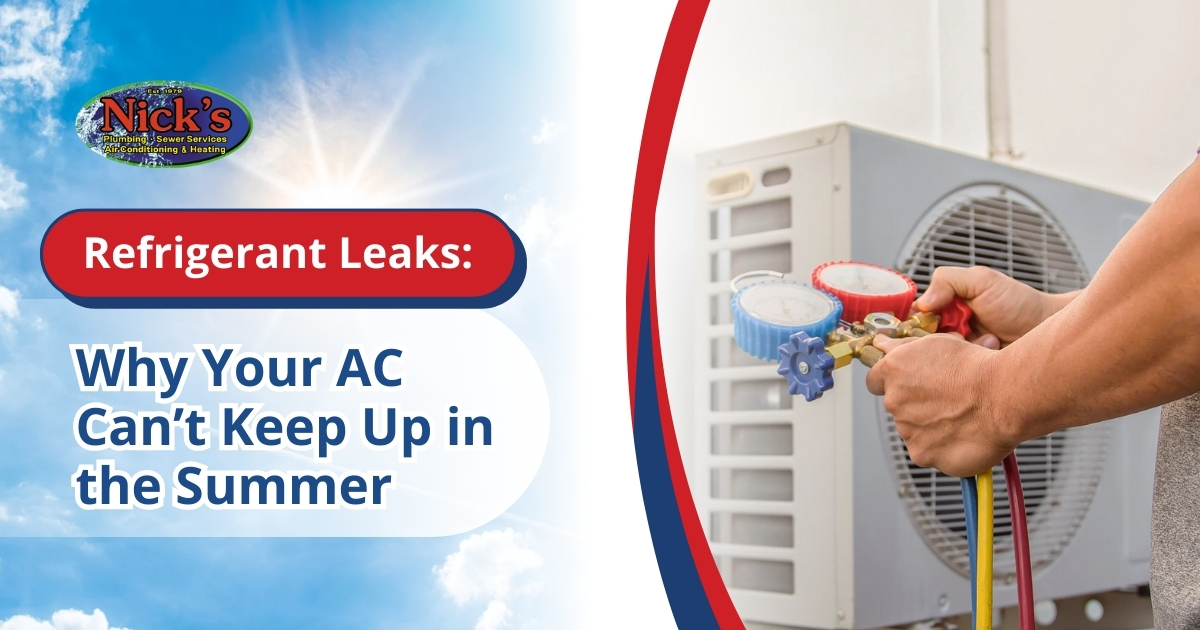Author: Jeff O'Hara
Quick Recap
-
If your Air Conditioner runs nonstop but doesn’t cool, a refrigerant leak may be the culprit—common in Houston’s heat and humidity.
-
AC Leaks are often caused by corroded lines, weak joints, factory defects, or years of stress on the system.
-
Telltale signs include warm air, ice buildup on coils, hissing/bubbling sounds, or unexplained spikes in energy bills.
-
DIY refrigerant refills aren’t safe or effective—only a certified HVAC technician can properly find, fix, and recharge your system.
If your air conditioner runs constantly but your home never seems to cool down, especially on those scorching Houston afternoons, there might be more going on than just bad luck or old equipment. One of the most common causes behind an underperforming AC system is a refrigerant leak.
Why Refrigerant Leaks Are a Summer AC Nightmare in Houston
Liquid refrigerant is the lifeblood of your air conditioning system. It absorbs heat from inside your home and releases it outside. When refrigerant levels drop, your system struggles to move that heat effectively. That means longer run times, warmer air blowing from your vents, and rising energy bills that make you sweat in more ways than one.
If you’re asking, “Why is my AC running but not cooling in the summer?” – a refrigerant leak could be the reason.
What Causes AC Refrigerant Leaks?
Refrigerant doesn’t get used up like gas in a car—it circulates in a closed system. So if it’s low, it’s because it’s escaping somewhere. And that’s where leaks come in.
Corrosion in Refrigerant Lines
Over time, exposure to moisture and airborne chemicals can cause tiny pinholes to form in your copper refrigerant lines. These may seem small, but they’re enough to let refrigerant slowly escape.
Corrosion often develops unnoticed until cooling performance drops.
Pinholes may require replacing sections of line or the entire coil.
Vibrations and Joint Damage Over Time
Your AC unit vibrates when it runs. Over years of use, that shaking can weaken the joints and connections between parts.
Loose fittings and cracked joints are common leak sources.
Vibrations can also lead to refrigerant escaping through microfractures.
Factory Defects or Poor Installation
Even brand-new systems can have refrigerant leaks if there was a manufacturing flaw or an error during installation.
Faulty welds or poorly connected tubing can leak from day one.
Wear and Tear from Houston’s Heat and Humidity
Improper charging during installation can also stress components.
This means your AC works harder than in most places.
That constant stress takes a toll.
High heat and humidity accelerate wear on seals, valves, and coils.
Aging systems are especially vulnerable to stress-related refrigerant leaks.
How Can I Tell If My AC Has a Refrigerant Leak?
Refrigerant leaks can sneak up on you, but there are usually some telltale signs. The most obvious? Your air conditioner is blowing warm air, even though it’s running constantly. That’s a sign the system can’t remove heat properly.
Other common signs of a refrigerant leak include ice forming on the refrigerant lines or evaporator coil, hissing or bubbling noises coming from the unit, or rising energy bills with no change in usage. These low refrigerant AC symptoms are your system’s way of waving a white flag.
Keep in mind, some of these symptoms might also point to other issues, so proper diagnosis by a professional is essential.
Is It Dangerous to Have a Refrigerant Leak?
While a small refrigerant leak doesn’t typically pose an immediate threat to your health, it shouldn’t be ignored. Refrigerants are chemicals, and prolonged exposure in a closed space could cause headaches, dizziness, or irritation for some people.
More importantly, refrigerant leaks are dangerous for your AC system. When levels are low, the compressor has to work harder, increasing the chance of overheating or total system failure. So even if the leak isn’t directly hazardous to you, it can be downright destructive to your equipment.
Can I Add Refrigerant Myself?
We get it—you want to fix the problem fast. But refrigerant isn’t something you should top off like windshield washer fluid. Adding refrigerant without addressing the underlying leak is like adding air to a tire with a hole in it.
Not only is it a temporary fix, but it can also be unsafe. Handling refrigerant requires EPA certification and the proper tools. DIY attempts could lead to further leaks, damage, or exposure to harmful chemicals.
Your best move? Get the system professionally checked. A licensed technician can find the leak, fix it, and recharge the system properly.
When Should I Call for Professional AC Repair?
If your AC is running but your house still feels like a sauna, and you’ve already checked your thermostat and air filter, it’s time to bring in a professional. The sooner you act, the less likely you are to face long-term damage to your system.
Call for help if:
- Your AC is blowing warm air
- Ice is forming on your lines or coils
- Your energy bill suddenly spikes
- You hear hissing or bubbling from your AC unit
The longer you let a refrigerant leak go, the more stress you put on your compressor—and that’s one of the most expensive parts to replace. It’s better to fix a leak today than replace a system tomorrow.
Why Book With Nick’s Air Conditioning?
Nick’s Air Conditioning has been helping Houston homeowners keep cool for over 40 years. Our technicians are trained to detect and repair refrigerant leaks the right way—with experience, EPA certification, and no guesswork. Our experienced techs know what signs to look for, how to test for refrigerant loss properly, and how to get your system running at peak efficiency again. We’re not here to scare you with hefty repair bills—to give you honest diagnostics and innovative, long-term solutions.
Whether your system needs a top-off and seal repair, or you’re dealing with a serious issue that calls for coil replacement, we’ll walk you through the problem and the options. No pressure, no pushy sales.
And if you’re part of our Smart VIP Maintenance Program, minor issues like refrigerant leaks are often caught during routine inspections, before they become big problems.
If your AC is underperforming during Houston’s hottest months, don’t assume it just “can’t keep up.” It might be a refrigerant leak holding it back. With professional help, your home can be cool and comfortable again—no sweat.


